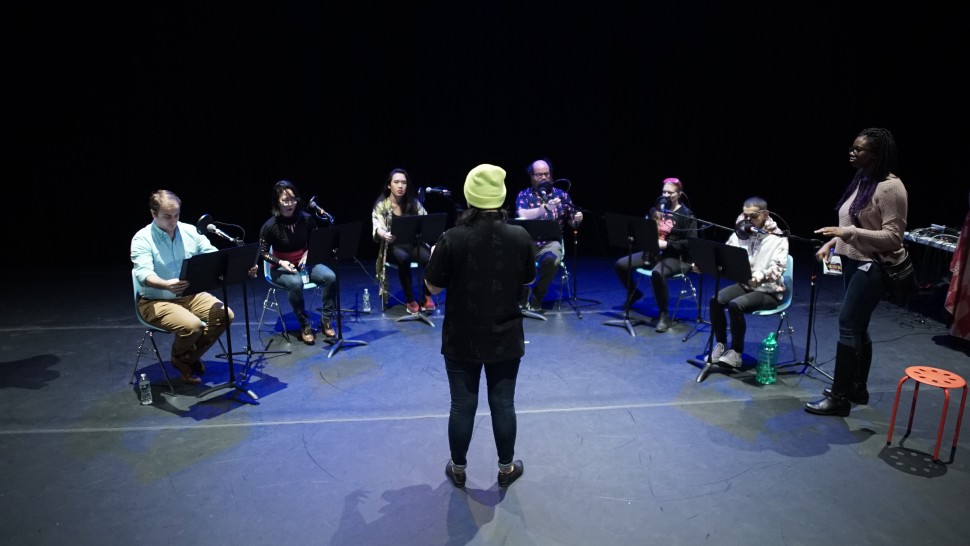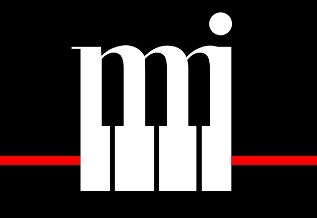“I’ve always loved how you have to be responsible for your own imagination in the podcast play format,” says Iyvon Edebiri, artistic director and host of The Parsnip Ship. For Edebiri, audio theatre—which is currently having a moment in the spotlight—has long been the go-to.
“In a theatre production, the interpretation of the world is given to you. Audio theatre forces you to really engage with the imagination in a way a lot of theatre makers and audiences don’t really get to do.”

Now in its fifth season, The Parsnip Ship has been showcasing bold new plays by emerging and established playwrights—with a focus on underproduced and underrepresented voices—since 2015. Featuring live music by local artists and recorded live with an audience in Brooklyn, each episode of The Parsnip Ship re-imagines the concept of the radio play with stories that explode notions of form and content.
We chat with Edebiri about building the platform and a community of artists over the years, shifting to live play broadcasts during COVID, digital community events, and more.
How do you find your plays and playwrights? Talk me through the submission process.
Iyvon Edebiri: We have an annual spring submissions process that specifically calls for playwrights who identify with a specific demographic that is still underproduced and underrepresented in the American theatre. Season 4 was all playwrights of color, Season 5 (interrupted due to COVID-19) is all womxn+/non binary femme playwrights and Season 6, which we’re in the process of evaluating, is all Queer playwrights.
We’re very specific about who we want to highlight on our platform. Our submissions process is done in two rounds: The first round asks the playwright to submit their first 15 pages and, if invited for the second round, we give the play a full read. This is a mostly decentralized and democratic process as I invite trusted theatre makers into the selection process to ensure an array of perspectives—since theatre and text are so subjective. It’s also important to me that decisions on our season curation aren’t through the lens of the demographic in power. So for Season 6 submissions (Queer storytellers), the first round was evaluated by all Queer theatre makers, while the second round will be evaluated by a majority Queer group of readers. As a cis-hetero woman who really wants to make sure our Season 6 artists already feel cared for once they apply, it was important for me to step back from the Round One read to ensure it wasn’t colored by a straight gaze and that the samples themselves were vetted by folx in the Queer community. It’s really at Round Two where we discuss the merits of the play in their entirety, as well as how it could be re-crafted as an audio play. The most important question we ask is: What would the world be missing if it didn’t have this play?
What was the driving impetus behind launching the podcast in 2015?
The original thought behind Parsnip was simply to record plays and music in a living room. I think we spent a few weeks thinking about it and how we could launch it. Once we had a more concrete idea, it was finding a play to record. I reached out to playwright Jose Rivera (I was part of his writer’s group) and asked if this was something he’d be interested in. Jose said yes and allowed us to record his play School of the Americas—we officially were able to launch.
What was something early that led you to say to yourself: I have to continue making this podcast?
I realized that I genuinely have a fun time making these episodes and connecting with artists. And once I understood the power of this platform and how it could be an innovative way for playwrights to showcase their works, I really leaned into making sure the platform was a reflection of my theatre community.
What would you say was the biggest learning curve from those early productions?
The biggest learning curve was formulating the structure of our live episode so it transferred well to a fully realized audio recording of this experience of a radio play. So the earlier episodes you’ll hear how we experimented with the order of the evening. The other major thing learned is that it’s so incredibly helpful to have an actual sound person who is proficient at live engineering and can work with artists to get them comfortable for the recording of the episodes.
Talk to me about the kind of community that The Parsnip Ship has fostered over the years?
We have fostered an awesome community that is essential to how we work and how we continue to build our platform as a resource. Over the last five years we’ve worked with 350-plus artists (playwrights, directors, musicians and actors) who have contributed to our platform. Sometimes collaborators already know each other and it’s a fun project to do together, and sometimes collaborators don’t know each other and we have to curate an episode in its entirety. Both have led to awesome artistic relationships; we see folx work on other projects with someone they met through Parsnip and that’s such an awesome feeling— knowing they connected through our platform.
In January, we hosted our first Parsnip Pop-Up, which was a drop-in brunch time writing with waffles session that was free for anyone to come to. Since we knew we weren’t able to gather in the immediate future, we decided to revamp the in-person Pop Up for the digital space and provide a weekly space for creatives to create community in an “accountability-lite” way. We’ve been fortunate to partner with other small orgs and collectives around the country whose missions align with our own to invite creatives from all over to join us.
Since our live episode recordings are on hold, we’ve been re-purposing our episodes for the digital space by doing weekly live radio play broadcasts on Facebook. These are a modern take on the radio-play concept of folx listening to a piece together but separate. And with Facebook’s chat function, folx are able to react and connect with other folx tuning in.

Theatres are shut for the foreseeable future. Have you found there to be increased interest in the podcast play format, and by that same token, in The Parsnip Ship?
Certainly! We’re seeing an influx of audio theatre and institutions buying into the idea as a way to give artists work and sustain audience engagement. For Parsnip specifically, we’ve seen a jump in our social media followers, engagement and folx emailing to inquire about how to get involved with us. I think what excites folx specifically is that we aren’t interested in maintaining the status quo or creating a special club of playwrights to produce. We’re really invested in the idea that this format should be, and can be, accessible,as much as it is intersectional in its artistic collaborators.
The Parsnip Ship isn’t the only thing you’ve got going on. Tell me how do you balance running the podcast with all of your other projects and roles?
I have been fortunate over the last year to be able to work with and for organizations who understand that Parsnip is incredibly important to me. It’s been nice being able to work around the needs of Parsnip, while still being able to have income coming in. Before COVID-19, a lot of my time was focused on producing and company management, but now there are no companies to manage, sadly. But fortunately, I’ve been able to lean into my skills as a dramaturg during this time and that’s been really rewarding and nice to shift my focus to supporting playwrights in a more focused and text-based way.
What is something that drives you to continue making theatre in this world?
I can’t go one day without hearing, reading, feeling, or experiencing a story, so what better way to spend my days than supporting storytellers?
The Parsnip Ship’s company’s team also includes Katy Donnelly, managing director, Todd Kirkland, digital operations director, Al Parker, artistic associate, Charlie Madison, development director, and Jesse Manning, consulting producer. The podcast is now available on iTunes, Spotify, and other podcast platforms, alongside all previous seasons.
For more information visit TheParsnipship.com.
